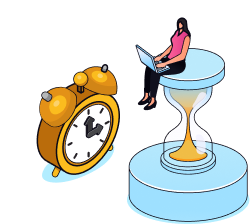
Does a Small Company Really Need a CRM?
Bigger, But Better: Why a Small Company Needs a CRM
If you are a small company, do you need to invest in a customer relationship management (CRM) system? The answer is yes. There are many benefits of using a CRM system, not the least of which is increased productivity.
Not only does it make things easier for your staff, but it also makes them more efficient and productive. If you want to learn about all the benefits that come with implementing a CRM system into your organization, then read on.
What Is a CRM and How Does It Work?
First and foremost, CRM stands for "Customer Relationship Management," a technology that tracks your customers' information.
This system helps companies increase productivity by improving communication between all departments, streamlining customer interactions, and managing employee workloads more effectively.
Businesses can also use it to take out unnecessary time wastage in their sales and marketing processes.
Any CRM system aims to act as central storage for all customer interactions so that critical information is readily available when it's needed the most.
It can track all details, including comments, complaints, special requests, and employee records. All this information gathered in one place means that the average business owner or manager doesn't have to spend hours finding out where things are stored or looking through piles of paperwork to find a substantial phone number.
How Do Big Organizations Use CRM?
Big businesses also use CRM to manage their customer base.
Since most large corporations have a lot of different departments, they must have a system in place so that all the staff knows which department they need to contact regarding specific requests or queries. It is essential in organizations where employees communicate with customers directly.
For example, you might be trying to get in touch with the technical support team of your internet service provider (ISP) when suddenly you are transferred to several different support lines until someone finally answers your call; this is incredibly frustrating.
A CRM system can help mitigate this issue by centralizing all information about each customer and ensuring everyone has access to the most up-to-date and relevant status information. Thus, instead of having to track down the details you need and wait on hold for hours on end, it can be readily available for all employees when a customer contacts the business with questions or complaints.
An organized system will also reduce frustration for customers. By making communication more efficient between customers and businesses, customers do not have to go through so many people before they finally reach someone who has access to their account information.
If anything comes up after they speak with customer support, they already know which department is responsible and what issues might arise during future interactions.
How Does a CRM Benefit Small Businesses?
Many companies think that implementing new technology like a CRM system is simply out of their budget. However, it's an investment that can save you so much time in the long run, and it will give your workforce a better productivity boost than almost any other change.
When you have a CRM system in place, all your customer interactions are stored centrally, so every staff member has access to this information.
That means they don't have to spend hours searching for files or calling around different departments to find the person responsible for a specific problem. Instead, they can pick up the phone and call someone who already works with the customer.
For example, if one of your employees needs to talk with a client about his account information or order status. He no longer has to wait on hold for hours at a time, trying to track down the correct department.
Ability to Save and Share Important Data
CRM allows all employees to access up-to-date information about customer orders or concerns while also helping you organize your other business operations by ensuring that the right people get assigned to various tasks.

Inventory Management and Tracking
You can also use this system for inventory management or tracking which styles or services sell incredibly well so you can restock faster and focus on producing popular items.
Besides, it might be difficult for your company to grow if you're running a small business and don't have the time or resources to manage all these various tasks. However, if you try using a CRM system, you can manage one central workflow instead of wasting time keeping track of each task individually.
How Does CRM Software Help an SMB With Marketing and Sales?
Using a CRM system can also help with marketing and sales initiatives since it will give you access to more accurate customer information, allowing you to make better decisions. For example, if one of your clients is interested in buying multiple units of the same item, this tells you that there might be strong demand for these products.
You can then increase the supply or lower the price so more people can afford them. It can also streamline business operations by giving employees easy access to customer information from any device connected to the Internet.
SMBs and CRMs
If your small or mid-sized business is looking to reap the benefits of a CRM there is an affordable option. Check out ArcCRM
crm system , customer relationship management software , crm software , inventory management
Leave a comment
Your email address will not be published. Required fields are marked *




